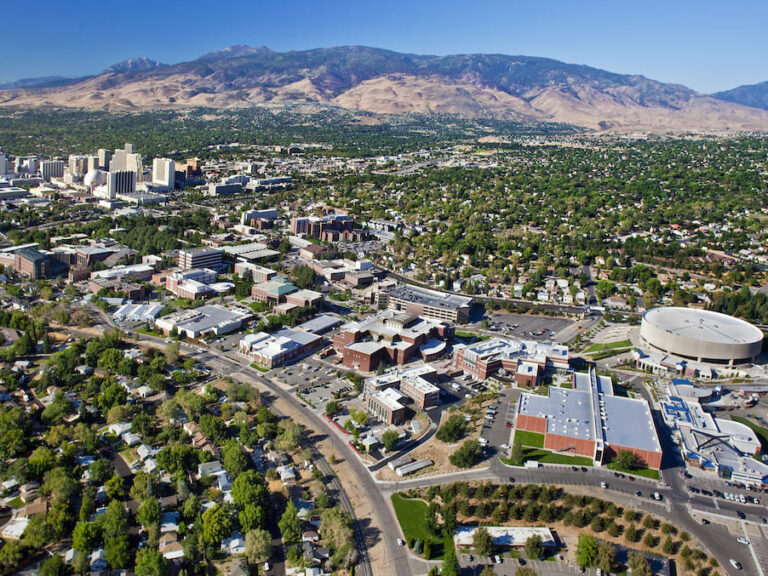Yesterday, the state Legislature's Interim Finance Committee approved $75 million in spending and a $7.5 million match from the U.S. Economic Development Administration to fund Nevada's Regional Technology Innovation Hubs (Tech Hubs). The state's $7.5 million partnership with the Economic Development Authority of Western Nevada (EDAWN) will help the state contribute to national security and create more power businesses and new jobs. This is a continuation of investment. national and state-wide economic development;
“I am proud to announce $7.5 million in new state funding for initiatives led by Tech Hub and the University of Nevada, Reno,” said Governor Joe Lombardo. “State funding will accelerate the center’s transformational activities and enable us to begin important innovation and research.”
In October 2023, the U.S. Department of Commerce Economic Development Administration (EDA) announced that Nevada has been selected as one of the first 31 regional technology and innovation hubs (Tech Hubs), led by the University of Nevada, Reno . Nevada was selected from a field of 489 applicants from throughout the United States and its territories.
Created as part of the CHIPS and Science Act of 2022, the Tech Hub program will provide assets, resources, and resources that will transform it into a globally competitive innovation center within approximately 10 years, while fostering the creation of good jobs. Invest directly in areas with potential. Fairly and inclusively support American workers of all skill levels.
Nevada Tech Hub is a network of more than 60 public-private partnerships with organizations from all Nevada counties working together to lead the state into a new era as a globally competitive innovation center. The University is working collaboratively with core members of the Nevada Tech Hub Consortium, including the Governor's Office of Economic Development, the Nevada Battery Coalition, and the Nevada Mining Association. These efforts will be collaborative, building on existing workforce development and advanced research and innovation efforts already being led by each campus in the Nevada System of Higher Education.
“As a proud graduate of the University of Nevada, Reno, I was honored to support the next phase of this important project with $7.5 million in funding. It will solidify Nevada's position as a world leader,” said Senate Majority Leader Nicole Cannizzaro. “Nevada’s tech hub is an essential part of our efforts to accelerate economic diversification and workforce development efforts, and this transformational opportunity will benefit all Nevadans.”
“I'm proud to support the state's funding battle for Nevada's tech hub,” said Senate Minority Leader Robin Titus. “The impact of these funds will support research, innovation, economic stability and community vitality across the state.”
As part of the Tech Hub Phase 2 Grant, approval is required today by members of the Interim Finance Committee. This grant will fund the implementation of a program designed to accelerate the technology and its commercialization. The approval paves the way for extensive coordination between universities and consortium partners aimed at workforce development and industry innovation, particularly through clean energy initiatives such as lithium batteries and EV materials. Become.
“Northern Nevada is uniquely positioned to lead the region in lithium battery development and power our nation's clean energy future,” said Nevada State Senator Jacky Rosen. “I worked with my colleagues across the aisle to ensure that the University of Nevada, Reno was chosen as a tech hub, driving economic development and creating tens of thousands of good-paying jobs. We are pleased to provide this funding and will continue to work with President Sandoval to bring federal investment to this important technology hub.”
“When I fought for Nevada's tech hub designation, I knew it would help support economic development and good-paying jobs in my home state,” said Nevada State Sen. Catherine Cortez Masto. ” he said. “Through my Innovation State Initiative, I will continue to help the University of Nevada, Reno and the entire Northern Nevada community stay at the forefront of lithium battery technology.”
Impacts of the Nevada Tech Hub project include:
- Provides a pathway to existing, well-established workforce development programs to educate, train, and transition the next generation of the workforce into the economy of the future.
- An estimated 50,000 new jobs will be created over five years across Nevada's 16-county tech hub region.
- It serves as the organizing force that directs targeted federal, state, regional, and local infrastructure investments for maximum impact in Nevada.
- Supporting R&D innovation and commercialization.
- Supporting improved ecosystem development for critical communities, including residents of Nevada's Native American tribes.
The University collaborates with more than 60 Nevada Tech Hub Consortium members and partners to advance research and development through improved supply chain enhancement efforts, broader workforce development strategies, and commercialization and entrepreneurship efforts. We will support specific initiatives, such as efforts to move them to market. Addressing community infrastructure, capacity, and housing challenges that our communities already face.
Nevada is home to a world leader in EV battery development and recycling, as well as the nation's only operating lithium mine, the largest producing lithium mine in North America, and advanced research infrastructure. . With raw materials, key human resources and advanced research and development co-located, the state is highly innovative.
“I would like to thank the members of the Interim Finance Committee for their approval, Governor Joe Lombardo for his continued support of this effort, and the more than 60 Nevada Tech Hub Consortium members for their belief in this broad effort. ” said the chairman. Professor Lino Brian Sandoval of the University of Nevada said: “We are looking for a generational shift in the future of Nevada’s economy, and today’s news brings us one step closer to making that a reality. We will be able to support the creation, attraction, retention and expansion strategies of a wide range of manufacturing-oriented businesses and workforce development activities.”


